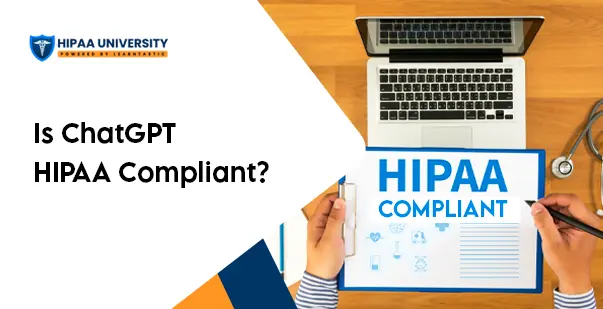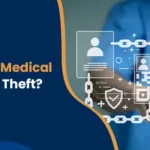Is ChatGPT HIPAA Compliant?

August 26, 2024
Artificial intelligence is everywhere these days—even in hospitals and clinics. Tools like ChatGPT can make life easier for doctors, nurses, and even patients. But here’s the catch: healthcare deals with private, sensitive data. And in the U.S., there’s a law called HIPAA—short for the Health Insurance Portability and Accountability Act—that protects that data.
So, when someone in healthcare wants to use AI, the obvious question is: Can we actually use ChatGPT and still follow HIPAA rules?
That’s what we’re going to unpack in this blog—how HIPAA works, what ChatGPT can and can’t do, and whether the two are a safe match.
Can Generative AI Like ChatGPT Work with HIPAA?
This is where things get a little tricky.
ChatGPT and other generative AI tools are great at speeding things up. Need to draft a note, answer a patient’s question, or look something up fast? AI can help with that. But when health data enters the picture, it’s not just about convenience—it’s about privacy.
So, is an AI like ChatGPT safe under HIPAA? Well, it depends. Here are a few key things that matter:
Encryption and Data Security
Any AI tool working with patient information needs more than just basic security. It must use strong encryption—both when data is stored and when it’s being sent. Without that, there’s a serious risk of exposing Protected Health Information (PHI), which HIPAA clearly prohibits.
De-Identifying Patient Data
One of the safer ways to use AI in healthcare is by removing anything that ties the data back to a specific patient. If the AI system needs to work with real PHI, it must follow every detail of HIPAA’s privacy rules. No shortcuts.
Signed Business Associate Agreements (BAAs)
Before bringing AI into the picture, healthcare providers must have a Business Associate Agreement in place with the vendor. This document spells out who’s responsible for what, how the data will be protected, and what happens in case of a breach.
Controlling Access and Tracking Use
Not everyone in an organization should have access to patient data. That’s why strict controls are needed—along with a system that logs who accessed what and when. These records help detect problems early and prove that HIPAA rules are being followed.
Staff Training and Awareness
People—not just systems—play a big role in compliance. Anyone using AI tools needs to be trained on how to handle PHI properly. Regular updates help prevent mistakes and reinforce the importance of doing things right.
Clarity and Accountability
If an AI tool is involved in processing or acting on patient information, there should be no mystery about how it works. Documentation should be clear, and someone needs to be accountable for its decisions—especially when patient privacy is on the line.
What’s ChatGPT Actually Doing in Healthcare?
Healthcare professionals are already experimenting with ChatGPT in a bunch of ways—especially for tasks that don’t involve diagnosing or treating patients directly. It’s not replacing doctors, but it’s starting to show up behind the scenes, helping teams work faster and communicate more clearly.
Here are a few ways it’s being used:
Explaining Things to Patients
Doctors don’t always have time to walk through every detail. ChatGPT can step in to explain medical conditions, procedures, or treatment options in everyday language.
Helping with Symptom Descriptions
While it doesn’t replace a real medical opinion, ChatGPT can collect and organize patient-reported symptoms before an appointment, saving valuable time.
Mental Health Check-Ins
Some platforms use it to offer simple emotional support—especially when someone needs to talk but can’t reach a therapist right away. It’s not a replacement for care, but it can help people feel heard.
Handling the Admin Load
Scheduling reminders, follow-ups, even initial intake questions—ChatGPT can take on small tasks that normally eat into a provider’s day.
Drafting Notes and Summaries
Writing clinical notes is time-consuming. ChatGPT can help draft or clean up those notes, so doctors can focus more on the patient than the paperwork.
Boosting Telehealth Visits
During virtual consults, it can help answer basic patient questions or generate post-visit summaries, making the experience smoother for everyone.
Digging Through Research
When a provider is looking into a treatment or clinical trial, ChatGPT can help scan and summarize research papers in seconds—not hours.
Giving Drug Info
Patients often want to know about side effects or dosage. ChatGPT can surface that kind of information quickly—though it still needs to be double-checked.
Staying in Touch with Patients
Follow-up messages, daily tips, gentle nudges to take medication—ChatGPT can help keep the line of communication open without overwhelming staff.
🔗 Read More: Is Microsoft Teams HIPAA Compliant?
So, is ChatGPT HIPAA Compliant?
Short answer? No, not right now.
ChatGPT may be incredibly smart when it comes to language—but that doesn’t mean it’s ready to handle sensitive patient information under HIPAA rules.
There are a few big issues:
- It wasn’t built with HIPAA in mind.
ChatGPT can process text that includes health information, but it doesn’t offer the safeguards that HIPAA requires. That includes how it handles, stores, or even routes that data. - Protected Health Information (PHI) isn’t fully secure.
Since ChatGPT isn’t designed specifically for healthcare use, there’s always a risk that PHI could be exposed—especially if data isn’t encrypted properly or stored on third-party servers. - No Business Associate Agreement (BAA)
Right now, OpenAI doesn’t sign BAAs with healthcare providers. And without one, HIPAA-covered entities can’t legally use the tool for anything involving PHI. - There’s no guaranteed breach response system.
HIPAA requires specific steps to be taken if patient data is exposed. ChatGPT doesn’t come with those protocols baked in.
Bottom line? If a healthcare organization uses ChatGPT without major modifications or protections in place, it runs the risk of violating HIPAA. That’s a serious issue—not just legally, but in terms of patient trust.
What Are the Risks of Using ChatGPT in Healthcare?
ChatGPT can be incredibly helpful—but in healthcare, helpful doesn’t always mean safe. Without the right guardrails, it introduces more risk than many teams might expect. Here’s where things can go wrong:
Private data can slip through the cracks.
ChatGPT wasn’t built for handling Protected Health Information (PHI). If patient details make it into the chat, they could end up stored, exposed, or used in ways that don’t align with HIPAA.
There are no HIPAA protections built in.
No encryption by default, no Business Associate Agreement (BAA), no formal compliance framework. That’s a serious gap.
It’s vulnerable to cyber threats.
Like any cloud-based platform, ChatGPT can be targeted. Without strong security controls, sensitive data is at risk.
Clinical context is often missing.
ChatGPT may sound sure of itself, but it can’t read between the lines. It doesn’t weigh medical history, subtle symptoms, or patient behavior the way a trained clinician would.
You can’t always see how it reached an answer.
That’s one of the bigger concerns. ChatGPT often works like a black box—making it hard to trace the logic behind its output. In healthcare, that lack of transparency can be a dealbreaker.
If something goes wrong, accountability gets murky.
Say a patient follows AI-generated advice and it backfires—who’s legally responsible? There’s no clear answer.
Bias can quietly shape outcomes.
AI models reflect the data they’re trained on. If that data’s flawed or one-sided, the results could be too.
Too much AI could dull human skills.
Over-relying on tools like ChatGPT might chip away at critical thinking or hands-on clinical experience over time.
The human side of care can take a hit.
Patients don’t just want answers—they want empathy. Automation, if overused, can make care feel distant.
Not everyone has access.
Patients in rural areas, older adults, or underserved communities may struggle to connect with digital tools. That deepens the care gap.
Integration is rarely seamless.
ChatGPT doesn’t plug smoothly into electronic health records (EHRs) or existing clinical systems. That can cause headaches for staff.
Data may not play well with other systems.
Even if ChatGPT pulls useful insights, getting those to mesh with EHRs or other platforms isn’t always straightforward.
The rules keep shifting.
Laws around AI in healthcare are still catching up. What’s acceptable now could be outdated in six months.
Guidelines are inconsistent at best.
With no universal standards, every organization is making up its own rules—which leaves room for serious risk.
Patients may misunderstand AI advice.
If someone uses ChatGPT to self-diagnose or plan treatment, they might act on the wrong info without realizing it.
🔗 Read More: What Does PHI Stand For?
So—is ChatGPT HIPAA compliant?
At this point, no.
That doesn’t mean it’s useless in healthcare. It just means it needs to be handled with care. ChatGPT wasn’t designed with HIPAA in mind, and that’s a problem if there’s any chance it could interact with Protected Health Information (PHI). No encryption guarantees, no Business Associate Agreements, and no built-in compliance tools—that’s not something a healthcare organization can afford to ignore.
If teams want to explore AI tools like ChatGPT, they’ll need to put strict boundaries in place: no sharing of patient identifiers, no integration with live clinical systems, and certainly no assumptions about security.
Until platforms like ChatGPT are built with HIPAA compliance from the ground up, the safest move is to treat them as support tools, not solutions. The potential is there—but so is the risk. And in healthcare, risk isn’t something you take lightly.





